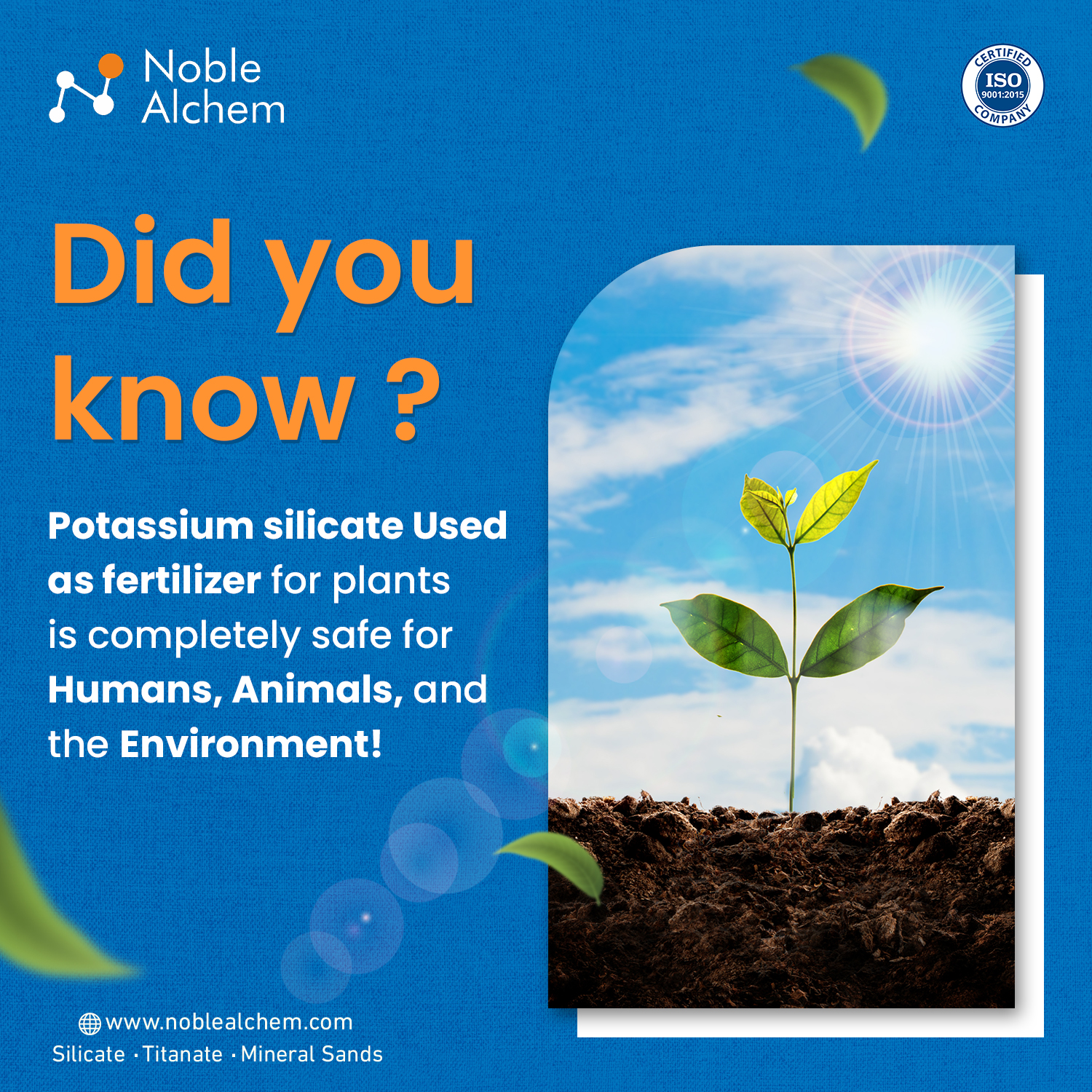Modern agriculture faces countless challenges, but one of the most pressing issues is crop disease. From fungal infections to bacterial attacks, diseases can drastically reduce yield, affecting both the quality and quantity of harvests. While traditional methods like chemical pesticides help, they often come with environmental and financial drawbacks. This is where potassium silicate liquid fertilizer emerges as a sustainable and effective solution.
In this blog, we’ll uncover the hidden benefits of potassium silicate and why it is becoming an essential component for cultivating disease-resistant crops.
What is Potassium Silicate, and Why is it Vital for Crops?
If you’re unfamiliar with potassium silicate, let’s start with the basics. Potassium silicate is a water-soluble compound that combines potassium (K) and silica (Si). These two nutrients are critical for plant growth and development, playing essential roles in strengthening plant structures and enhancing their ability to combat stress.
So, what makes potassium silicate stand out compared to other fertilizers? The answer lies in its dual-action mechanism:
- Nutrient Provider: Potassium silicate supplies silica, which plants use to build stronger cell walls. This fortifies plants against environmental stressors and pathogens.
- Disease Fighter: The silica content acts as a barrier, making it harder for pathogens to penetrate the plant tissues.
By focusing on long-term plant health rather than quick fixes, potassium silicate ensures robust crop growth and improved disease resistance.
How Does Potassium Silicate Protect Crops from Diseases?
1. Enhancing Plant Cell Walls
One of the primary ways potassium silicate boosts disease resistance is by strengthening plant cell walls. Think of silica as the plant’s armor—it fortifies the outer layer, making it difficult for harmful fungi, bacteria, and viruses to breach.
2. Triggering Natural Defense Mechanisms
Potassium silicate doesn’t just act as a physical shield; it also triggers the plant’s natural immune responses. When a plant senses silica, it activates its defense mechanisms, such as producing antimicrobial compounds that neutralize pathogens.
3. Reducing Susceptibility to Pathogens
By improving the overall health of the plant, potassium silicate reduces the likelihood of infections taking hold. Healthier plants are naturally more resilient, and potassium silicate ensures they have the strength to fend off diseases effectively.
4. Inhibiting Spore Germination
Potassium silicate creates unfavorable conditions for spore germination on plant surfaces. This means that even if fungal spores land on your crops, they are less likely to grow and cause infections.
What Crops Benefit the Most from Potassium Silicate?
Wondering if potassium silicate is suitable for your crops? It is incredibly versatile and can be used across a wide range of plants, including:
- Tomatoes: Protects against blight and improves fruit quality.
- Rice and Wheat: Boosts tolerance to fungal diseases like powdery mildew and leaf rust.
- Cucumbers: Enhances resistance to downy mildew and improves yield.
- Bananas: Reduces susceptibility to sigatoka and other fungal infections.
- Ornamental Plants: Improves aesthetics and prevents common diseases like leaf spots.
By incorporating potassium silicate into your farming practices, you can target disease-prone crops and significantly reduce yield losses.
How Does Potassium Silicate Compare to Traditional Fertilizers?
Farmers often rely on traditional fertilizers for plant nutrition, but these rarely address disease resistance. Here’s how potassium silicate stands out:
- Focus on Prevention: Unlike chemical treatments that target diseases after they appear, potassium silicate helps prevent infections before they occur.
- Eco-Friendly Solution: Reduces the need for synthetic pesticides, promoting sustainable farming practices.
- Improves Soil Health: Potassium silicate contributes to long-term soil improvement, unlike chemical fertilizers that may degrade soil quality over time.
By combining potassium silicate with other farming techniques, you can achieve a more holistic approach to crop management.
How Can Potassium Silicate Reduce Pesticide Usage?
The overuse of pesticides in farming is a well-documented issue, leading to soil degradation, water pollution, and pesticide-resistant pests. Potassium silicate offers an eco-friendly alternative by:
- Reducing Pesticide Dependence: Healthier, silica-fortified plants require fewer chemical treatments.
- Promoting Eco-Friendly Practices: Fewer pesticides mean a reduced environmental footprint.
- Cost Savings for Farmers: Less spending on chemical inputs translates to better profit margins.
Can Potassium Silicate Combat Abiotic Stresses Too?
Crops are not just threatened by diseases; they also face challenges like drought, salinity, and extreme temperatures. Potassium silicate helps in this regard as well:
- Drought Resistance: Silica reduces water loss by forming a protective layer on plant leaves.
- Salinity Tolerance: Potassium silicate minimizes the toxic effects of saline soils, ensuring better growth.
- Heat Stress Mitigation: Enhances the plant’s ability to endure high temperatures without compromising yield.
By addressing both biotic (disease) and abiotic (environmental) stresses, potassium silicate proves to be an indispensable tool for modern farmers.
How to Use Potassium Silicate for Maximum Benefits
To make the most of potassium silicate, it’s important to apply it correctly. Here’s a quick guide:
- Dosage: Follow manufacturer recommendations based on crop type and growth stage.
- Application Method: Use it as a foliar spray or soil drench for effective absorption.
- Timing: Apply during early growth stages and continue periodically throughout the crop cycle.
- Compatibility: Ensure compatibility with other fertilizers or pesticides to avoid adverse reactions.
By adopting these practices, you can maximize the benefits of potassium silicate for your crops.
Why Choose Noble Alchem for Potassium Silicate?
At Noble Alchem, we understand the importance of quality and sustainability in agriculture. Our potassium silicate liquid fertilizer is formulated to deliver maximum benefits, ensuring your crops stay healthy and disease-free. Here’s why farmers trust us:
- High-Quality Products: Our potassium silicate is manufactured to meet industry standards, offering consistent results.
- Eco-Friendly Solutions: We prioritize sustainability, helping you reduce your environmental impact.
- Expert Support: Our team of agricultural experts is always ready to assist you with product recommendations and usage tips.
Whether you’re growing vegetables, cereals, or ornamental plants, Noble Alchem’s potassium silicate is the perfect partner for achieving healthier, disease-resistant crops.
Conclusion: The Future of Disease-Resistant Farming
As crop diseases continue to threaten global food security, innovative solutions like potassium silicate are more important than ever. By strengthening plant defenses, reducing pesticide usage, and combating abiotic stresses, potassium silicate offers a sustainable pathway to resilient agriculture.
Ready to transform your farming practices? Discover the benefits of Noble Alchem’s potassium silicate liquid fertilizer today. Contact us for more information or to place your order, and take the first step towards healthier crops and higher yields.
Get in Touch with Noble Alchem Now!



